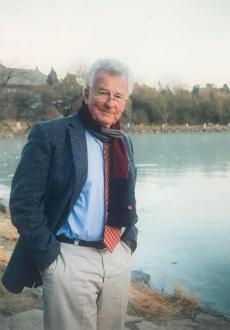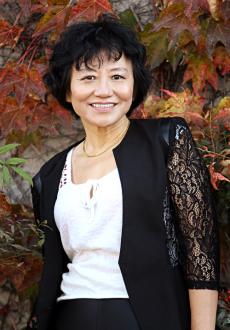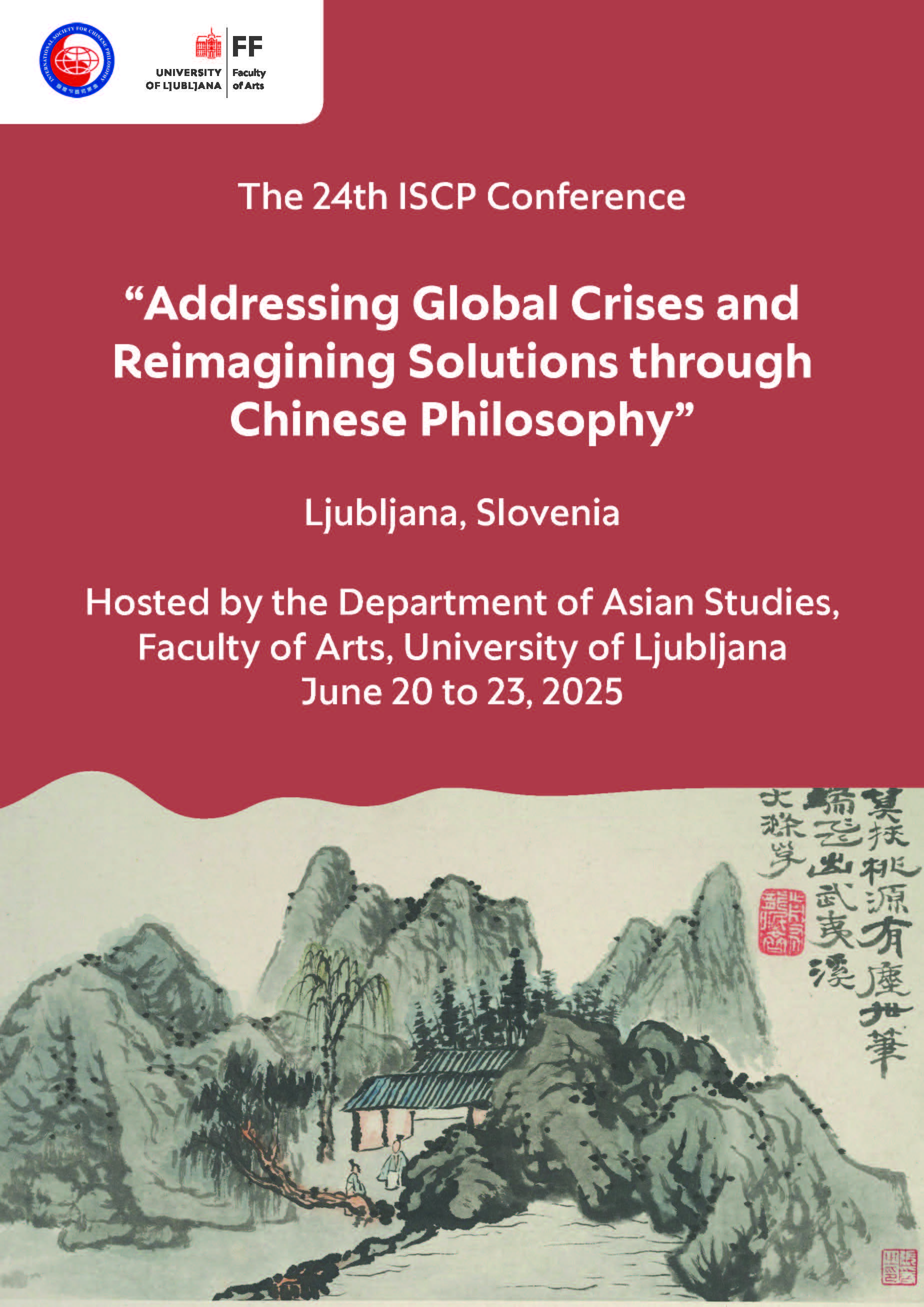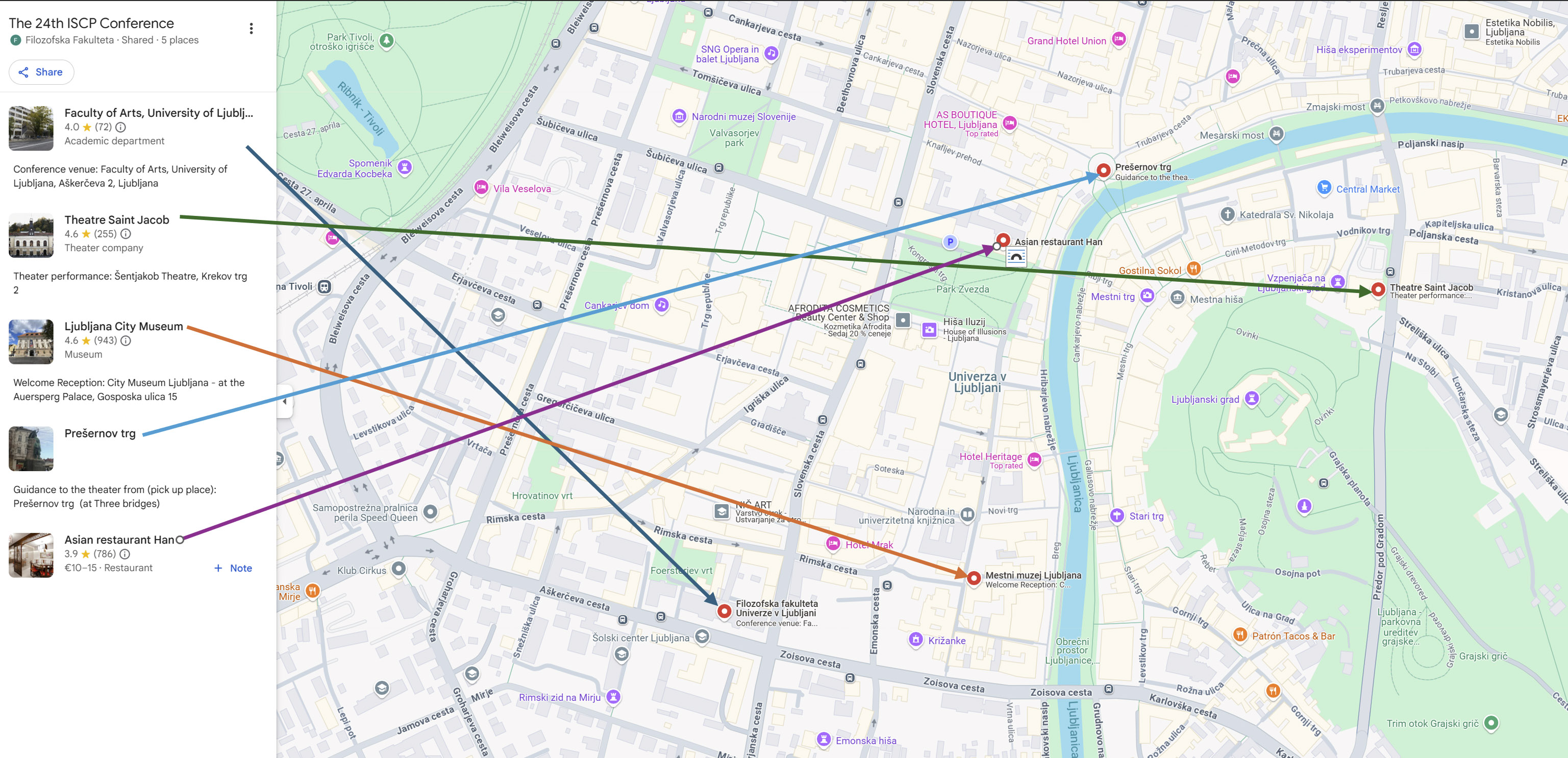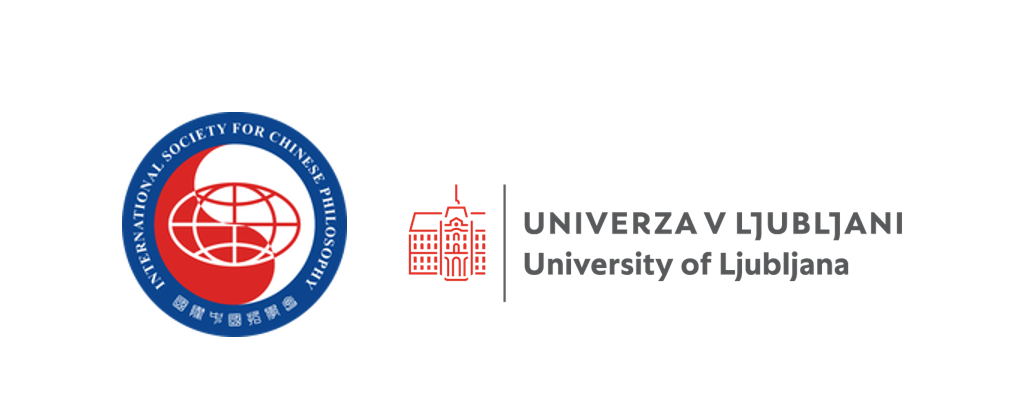

The 24th ISCP Conference
"Addressing Global Crises and Reimagining Solutions through Chinese Philosophy"
Ljubljana, Slovenia
Hosted by the Department of Asian Studies, Faculty of Arts, Ljubljana University
June 20 to 23, 2025
The event will be photographed. The photos will be published on the website and social networks of the Faculty of Arts, University of Ljubljana for promotional purposes.
Early registration will be available on Thursday, June 19, from 6:00 to 8:00 PM at the conference venue, in the aula of the Faculty of Arts, Aškerčeva 2. Regular registration will begin on Friday, June 20, at 7:30 AM at the same location. During on-site registration, you will receive a conference bag with all essential materials and your name tag.
Please note that, in order to register, the registration fee must be paid in advance and exclusively online. On-site payment is not possible. Participants who have not paid the fee in advance will not be able to register.
Extended period for online registration: May 18–23, 2025 (see the link under the tab »Registration Fee Payment – Open until May 23« above).
Due to numerous subsequent requests, we have reopened the option to pay the conference fee. Without payment of the fee, on-site registration—that is, the collection of conference materials—is not possible. Latecomers may still pay the fee during the additional period from May 18 to May 23, 2025, via the link below.
https://www.ff.uni-lj.si/en/registration-24th-international-society-chinese-philosophy-conference
The 24th ISCP conference in Ljubljana will revolve around the compelling theme of
"Addressing Global Crises and Reimagining Solutions through Chinese Philosophy."
The current crises, such as severe environmental disasters, unequal distribution of resources, viral pandemics, etc., are global problems that cannot be fully solved within the narrow framework of individual countries or nation-states . They must also be addressed within the larger framework of global cooperation and solidarity. Such strategies require the development of genuine intercultural dialogue, i.e., dialogue that goes beyond the currently fashionable terminologies and can lead to a truly equal transcultural exchange of knowledge and ideas. In this endeavor, this conference will focus on the traditional and contemporary Chinese philosophy.
Chinese philosophy offers various insights and principles that can potentially contribute to reimagining solutions for global crises. Here are a few examples:
1. Environmental Sustainability: Chinese philosophy emphasizes harmony with nature and the maintenance of equilibrium. By integrating these principles into environmental policies and practices, it can help foster sustainable development, promote ecological balance, and address issues like climate change and biodiversity loss.
2. Social Harmony and Conflict Resolution: Chinese philosophy places significant emphasis on social harmony and balance. It offers valuable perspectives on conflict resolution, emphasizing communication, mediation, and finding common ground. Applying these principles can aid in addressing social conflicts, promoting inclusivity, and fostering peaceful coexistence.
4. Holistic Health and Well-being: Traditional Chinese medicine and philosophies such as Daoism promote a holistic approach to health and well-being. Integrating these principles into healthcare systems can offer alternative perspectives on preventive care, mind-body balance, and the integration of natural therapies, potentially contributing to improving global health outcomes.
3. Relationism, an ethical framework deeply rooted in Confucian discourses, offers a profound perspective that places a strong emphasis on the interconnectedness and interdependence of individuals within a social context. Central to this philosophy is the recognition that the self is not an isolated entity but rather a relational self, with its identity being shaped and constituted through meaningful relations with fellow human beings and even non-human entities. Such ethics is not based upon values such as rivalry and interpersonal competition, but rather on empathy, solidarity, and cooperation. These values guide individuals to recognize the inherent worth and dignity of others and to foster harmonious relationships based on mutual respect and care. By cultivating empathy, relationism encourages individuals to extend their understanding and compassion beyond their own experiences, fostering a sense of interconnectedness and shared humanity.
5. Economic Equity and Balance: Chinese philosophy, including concepts like the Middle Way, advocates for balance and equitable distribution. These principles can inform economic policies that aim to reduce wealth disparities, promote inclusive growth, and address global economic crises such as income inequality and poverty.
Undoubtedly, a global perspective is of great importance for the development of all scientific and academic disciplines of our time. This is especially true for the humanities, which have hitherto developed in a fragmentary manner, within the framework of individual discourses isolated from one another, often confined to the framework of particular histories of ideas and languages. Therefore, we need to promote the transcultural exchange of knowledge and ideas, which is more important than ever in today’s globalized world and in a time of widespread crises. As the central crises and problems of our time manifest themselves on a global scale, a globalization of epistemology is also necessary, since such crises and problems can only be solved through informed and up-to-date scholarship that takes into account the issues of equality and justice of all cultures and peoples while meeting the demands of our time. Importantly, this globalization of scientific discourse must not be based on standardization rooted (as it has been) in the economic-political supremacy of those regions that have established the current centres of global power and dominance, but on equality that is different from sameness because it is based on cultural, linguistic, and axiological diversity.
Therefore, the conference will also welcome issues linked to comparative and post-comparative transcultural philosophy as a significant way of exchanging knowledge and ideas beyond the narrow confines of individual languages, histories and cultures.
In this respect, this academic gathering will include comparative analyses of different ethical models with the different culturally conditioned views of the Other and with the question of different types of humanism. On this basis, we are interested in examining the ideational foundations of the Self and subjectivity in the Chinese philosophical traditions on the one hand and in global intellectual histories on the other. In these perspective, the conference will welcome elaboration of issues related to the concept and protection of privacy as well as personal freedom and autonomy in the face of new technologies of digital control and the exploitation of personal data.
I hope that our dialogues will make at least a small contribution to solving the axiological, and thus also the social and political crises, of today’s world, to bringing together seemingly distant cultures and traditions, and to structuring intersubjectivity and the relationship between the individual and society in such a way as to be based on a new, solidaric conceptualization of humaneness, while at the same time taking into account the personal dignity and integrity of all individuals.
Esteemed colleagues, dear friends,
As the current president of the International Society for Chinese Philosophy, it is my great pleasure to welcome you to the 24th ISCP Conference, hosted this year in the culturally vibrant city of Ljubljana, Slovenia. I must say, if there’s ever been an ideal place to ponder ancient wisdom and reimagine the future, it’s this charming town at the crossroads of European cultures, where a rich history seamlessly mingles with a vibrant, modern spirit.
Our theme, "Addressing Global Crises and Reimagining Solutions through Chinese Philosophy," resonates deeply with our shared commitment to explore the timeless insights of Chinese philosophical traditions and apply them to our contemporary, ever-changing world—where, let’s be honest, a little ancient wisdom couldn’t hurt.
As we gather to exchange ideas and perspectives, we are reminded of the unique insights that Chinese philosophy offers in addressing the complex challenges of our time. Issues such as environmental degradation, social inequality, military conflicts, and the ethical dilemmas inherent in technology and governance invite promising examination through the lenses of Confucianism, Daoism, and other key schools of Chinese thought. These traditions, along with their contemporary developments and (re)interpretations, offer intellectual frameworks that are both deeply insightful and practically applicable for reimagining effective solutions.
It is a privilege to welcome the assembly of distinguished scholars, theoreticians, and students from around the globe. I am convinced that your participation will not only enrich our current global discussions in the field of philosophy, but also enhance the bonds within our international community, fostering an atmosphere of collaboration and mutual respect.
We look forward to the engaging presentations, insightful discussions, and meaningful connections that this conference promises. May our time together in Ljubljana be both intellectually stimulating and personally rewarding. I also hope that we will not only spark some brilliant ideas but also share a few laughs, catch up with old friends, and make some new ones along the way, because deep thinking and good company can always go hand in hand.
Thank you for your valuable contributions, and welcome to the 24th ISCP Conference.
With sincere regards,
Jana S. Rošker
President of the International Society for Chinese Philosophy
We are pleased and honored to announce the three keynote speakers for our conference—distinguished, internationally renowned scholars in Chinese philosophy. Though their reputations precede them, we have included brief biographies below:
Roger T. Ames 安樂哲 is Humanities Chair Professor at Peking University, Senior Academic Advisor of the Peking University Berggruen Research Center, and Professor Emeritus of Philosophy at the University of Hawai’i. He is former editor of Philosophy East & West and founding editor of China Review International. Ames has authored several interpretative studies of Chinese philosophy and culture: Thinking Through Confucius (1987), Anticipating China (1995), Thinking from the Han (1998), and Democracy of the Dead (1999) (all with D.L. Hall), Confucian Role Ethics: A Vocabulary (2011), and most recently Human Becomings: Theorizing ‘Persons’ for Confucian Role Ethics (2020). His publications also include translations of Chinese classics: Sun-tzu: The Art of Warfare (1993); Sun Pin: The Art of Warfare (1996) (with D.C. Lau); the Confucian Analects (1998) and the Chinese Classic of Family Reverence: The Xiaojing (2009) (both with H. Rosemont), Focusing the Familiar: The Zhongyong (2001), and The Daodejing (with D.L. Hall) (2003). Almost all of his publications are now available in Chinese translation, including his philosophical translations of Chinese canonical texts. He has most recently completed the new Sourcebook in Classical Confucian Philosophy (2023) with its companion A Conceptual Lexicon for Classical Confucian Philosophy (2021), and in writing articles promoting a conversation between American pragmatism and Confucianism.
Robin R. Wang is Professor of Philosophy at Loyola Marymount University, Los Angeles and The Berggruen fellow (2016-17) at The Center for Advanced Study in the Behavioral Sciences (CASBS), Stanford University. Her teaching and research focus on Chinese and Comparative Philosophy, particularly Daoist philosophy, as well as the intersections of women and gender in Chinese thought and culture. She has published a wide range of essays, that bridge classical Daoist philosophy with modern philosophical discourse, offering critical insights into their relevance in addressing contemporary global challenges. She is the author of the acclaimed book, Yinyang: The Way of Heaven and Earth in Chinese Thought and Culture (Cambridge University Press, 2012) and the editor of Chinese Philosophy in an Era of Globalization, (SUNY Press, 2004) and Images of Women in Chinese Thought and Culture: Writings from the Pre-Qin Period to the Song Dynasty (Hackett, 2003). She is the member of Steering Committee for Fédération Internationale des Sociétés de Philosophie (International Federation of Philosophical Societies) (FISP)where she actively engages in shaping the future of philosophical inquiry on a global stage. She has also regularly served as a peer reviewer for publishers, contributing to the advancement of academic excellence across multiple disciplines.
Heiner Roetz studied Sinology and philosophy at Johann Wolfgang Goethe University in Frankfurt am Main where he received his PhD in 1983 and finished his habilitation in 1990. From 1998 to 2018 he was professor for Chinese history and philosophy at the Ruhr-University in Bochum. Since his retirement, he is senior professor at the Bochum Faculty of East Asian Studies. Among his publication are Mensch und Natur im alten China (1984), Confucian Ethics of the Axial Age (1993), Konfuzius (3rd ed., 2006), and Klassische chinesische Philosophie. Eine Einführung (together with H. Schleichert, 4th ed. 2021).
To demonstrate our deep respect for diversity and inclusion, which can unfold in the most exciting way through the exchange of ideas and knowledge as well as transcultural dialogues, this conference will also be the inaugural part of the European Summer of Chinese Philosophy 2025. The 24th ISCP Conference will convene in Ljubljana, Slovenia, from June 20 to 23. Following this, the 5th Conference of the European Association for Chinese Philosophy (EACP), themed "Selfhood and Externality," is scheduled for June 26 to 28 at the University of Iceland in Reykjavik (contact person: Geir Sigurðsson, email: geirs@hi.is). Subsequently, from July 4 to 6, the 1st Education Network of the European Association of Chinese Philosophy (EN-EACP) Conference will take place at the Free University of Berlin, Germany. This event, which is a seminar workshop mainly addressing the graduate students, is titled “Way and Being: Between Daoist and Pre-Socratic Approaches” (contact persons: Fabian HEUBEL (heubel@gate.sinica.edu.tw) and Dimitra AMARANTIDOU (damarantidou@um.edu.mo).
The 24th ISCP conference will also mark a major milestone in the history of our society as it celebrates its 50th anniversary. It will once again demonstrate that the Society, founded by Professor Cheng Chung-Ying in 1975, has proven to be one of the most important bridges between Western and Chinese philosophy and an important platform for a much-needed transcultural philosophical dialog in the half century of its existence. With this historic meeting, we want to show that it has developed and will continue to flourish in a highly positive manner, demonstrating its respect for diversity and inclusion, which are also among the most important features of the Chinese philosophical tradition.
Timeline:
Deadline for submission of abstracts and panel proposals: October 15, 2024
Communication of acceptance: December 15th 2024
Online registration will be opened from February 1, 2025
Deadline for online registration: April 24, 2025
- Conference venue: Faculty of Arts, University of Ljubljana, Aškerčeva 2, Ljubljana
- Welcome Reception: City Museum Ljubljana - at the Auersperg Palace, Gosposka ulica 15.
- Theater performance: Ljubljana St. Jacob Theatre, Krekov trg 2
- Guidance to the theater from (pick up place): Prešernov trg (at Three bridges)
- Closing dinner for all participants: Asian Restaurant Han, Kongresni trg 3.
Google maps link.
Jana S. Rošker (chief academic organizer) jana.rosker@ff.uni-lj.si
Maja Maria Kosec (chief coordinator) MajaMaria.Kosec@ff.uni-lj.si
Téa Sernelj tea.sernelj@ff.uni-lj.si
Marko Ogrizek marko.ogrizek@ff.uni-lj.si
Severin Lorenčič severin.lorencic@ff.uni-lj.si
Jasna Bavec jasna.bavec@ff.uni-lj.si
As part of the conference, we’re excited to offer attendees the opportunity to discover the local attractions and culture through two curated excursions. Organized by a trusted external provider, these tours provide a unique way to unwind, connect with fellow attendees, and immerse yourself in the charm of Slovenia.
Spaces may be limited, so we encourage early registration! For further information, registration and payment please contact: DESETIBRAT.POTOVANJA@GMAIL.COM
You can sign up for both trips until June 5, 2025.
Details of the excursions can be found below.
EXCURSION 1 (June 24th)
GORENJSKA REGION – Bled – Begunje – Radovljica
Alpine lake, traditional music, medieval towns and beekeeping tradition. (see this link)
We start our day driving towards the Bled town. We will visit the iconic Bled Castle, perched high on a cliff, offering breathtaking views of the lake and its surroundings. We can explore its museum, which showcase the rich history of the region. We can also step into medieval printing workshop to learn about traditional printing techniques.
From the castle, we make our way to the shores of Lake Bled and board a traditional pletna boat. Boatman will take us across the serene waters to Bled Island. On the island, we visit the idyllic Church of the Assumption and ring the famous wishing bell, believed to make your dreams come true.
After our visit to Bled, drive to the charming village of Begunje na Gorenjskem (see this link), known for its rich musical heritage. Explore the Avsenik Museum (link), dedicated to the legendary Slovene folk music band, and immerse yourself in the history of Slovene polka music. The Avsenik Brothers pioneered a unique Alpine popular folk music style that captivated audiences across the entire Alpine region. Their signature sound, blending lively polka rhythms with rich harmonies, became a cultural phenomenon. At the height of their success, they sold more records than the Rolling Stones, marking a golden era in European folk music. Visit the museum to experience their legacy and the timeless charm of their melodies.
Then, enjoy a delicious lunch at the Avsenik restaurant, savouring traditional Slovenian dishes in a warm and inviting setting.
In the afternoon, we continue our journey to Radovljica (link), a beautifully preserved medieval town – true hidden gem. We stroll through its picturesque streets lined with colorful facades and historic buildings. We will visit the Museum of apiculture to learn about Slovenia’s proud beekeeping tradition and the fascinating world of bees. (link)
Drive back to Ljubljana.
Price: 160 EUR/ person (at minimum 20 participants)
Included: AC bus, entrance fee to Bled castle, Apiculture museum & Avsenik museum, pletna boat, lunch with a glass of wine, guide, VAT.
EXCURSION 2 (June 24th)
SLOVENIAN COASTAL REGION - Postojna Cave - Lipica - Piran
Best of Coast and Karst: Postojna Cave, Lipizzaner horses, Culinary delights and Piran town
We begin our journey with a drive from Ljubljana to the spectacular Postojna Cave. (see this link) We take an unforgettable ride on Postojna Cave's underground train and explore the breathtaking underground world of vast caverns, rushing subterranean rivers, and stunning stalactites and stalagmites. As we wander through this natural wonder, marvel at the immense underground canyon and learn about its geological and cultural significance.
After our cave adventure, we stop at a quaint village nearby to enjoy a traditional Slovenian lunch. Savor the authentic flavors of the region with a tasting of dry-cured ham (pršut) and a glass of the famous Teran wine, a local specialty produced from the unique red soil of the Karst region.
We continue our journey with a scenic drive past the Lipica stud farm, the historic birthplace of the world-renowned Lipizzaner horses. (link) Take in the beautiful surroundings as you pass by the rolling pastures and white horses grazing in the fields.
Our final destination is Piran, a charming coastal town on Slovenia's Adraitic coast, known for its Venetian style architecture, narrow medieval streets and stunning sea views. (link)
We start our tour at Tartini square, named after famous composer and violinist born in Piran, before strolling up the historic streets for panoramic views above the cliff at St Goerge's Parish church. A gelato before we return to Ljubljana is a must.
Drive back to Ljubljana.
Price: 160 EUR/ person (at minimum 20 participants)
Included: AC bus, entrance fee to Postojna Cave, guided tour of Piran town, lunch with a glass of wine, dry ham tasting, guide, VAT.
Theater performance
The Department of Asian Studies at the University of Ljubljana proudly presents a dynamic cultural program to enhance this year's ISCP conference. This event goes beyond the conventional academic framework, embracing a fusion of theory and art that has become a cherished tradition within our department.
This year’s spectacle, titled “Frog in the well -A Tale of Everything in Nothing” is thematically linked to the conference topics and is a highlight of our accompanying cultural program.
The performance blends theater, music, and dance, all enriched by the timeless wisdom of Zhuangzi, a classical Chinese Daoist philosopher. We revisit his tale of the frog limited to the view from its well—until a sea turtle offers a glimpse of a broader horizon. Inspired, the frog ventures worldwide, tackling contemporary wonders and problems, pleasures and sufferings, only to return home with a new perspective: What once was a mere well appears as a gateway to an infinite abyss of nothingness.
This metaphor invites us to break free from our narrow viewpoints and embrace broader perspectives—though accepting this invitation is entirely optional, and formal attire is not required.
Join us as we plunge into deep self-awareness and ascend into the vast, intricate webs of our globalized existence. Together, we'll explore the paradox of an interconnected universe, navigating the tumult of human life as we confront the complexities of existence. By engaging with the principles of Chinese philosophy, we gain insight into harmonizing contradictions, finding balance within chaos, and embracing a holistic approach to the challenges of our times.
VENUE
Ljubljana St. Jacob Theatre (https://www.lgl.si/si/o-gledaliscu/dvorane/sentjakobski-oder), Krekov trg 2 in Ljubljana.
DATE AND TIME
Sunday, June 22, 2025, at 8:00 PM
CAST
Director and choreographer: Ryuzo Fukuhara
Script and production: Jana S. Rošker
Frog: Marko Ogrizek
Turtle: Téa Sernelj
Mr. Greedmore and Guerilla contact: Luka Culiberg
Dictator: Ryuzo Fukuhara
Intellectual dissident and Reader: Tajda Kolenc
Child: Maksim Culiberg
Mind: Mercedes Valmisa
Omnipresent voice (AI) and Heart: Vida Krevs
Soldier: Anja Bradić
Common subject and Civilian: Vytis Silius
Dancers: Tajda Kolenc, Maja M. Kosec, Marija Mitevska
Music: The Eternal Problems Trio
Piano: Dejan Berden
Saxophone, clarinet: Marjan Farič
Vocal: Jana S. Rošker
MUSIC
One Meatball (Music by Hy Zaret, lyrics by Lou Singer)
Money Makes the World go Around (from Cabaret, Music by John Kander, lyrics by Fred Ebb)
Last Night (Folk song from Prekmurje, Slovenia)
You Don't Own Me (John Madara and David White)
You’re Innocent When You Dream (Music and lyrics by Tom Waits)
Going Home (instrumental version); (Music by Antonín Dvořák, adapted from the Largo movement of his Symphony No. 9)
The Axis of the World (Music by Billy Strayhorn, lyrics by Jana S. Rošker)
Here are different transportation options from Ljubljana Airport to your hotel:
There are different possibilities (shuttle bus, taxi, public bus, etc) to get from the Ljubljana airport to the hotel. You can explore them here.
Uber is available through your app or this website.
1. Shuttle Bus:
- 4 different providers (see the following link) who offer flexible timings and can drop you off directly at your hotel. You can book tickets in advance online for better rates.
- Nomago Shuttle Service (see this link)
2. Taxi:
- Location: Taxi stand outside the arrivals area
- Cost: Approximately €40 to the city center. Prices can vary depending on the taxi company and time of day.
- Travel Time: About 20-30 minutes to the city center, depending on traffic.
We recommend avoiding the taxis waiting in front of the airport, as they are often overpriced. Instead, consider pre-booking a ride at competitive rates to bypass the taxi line.
Here are some links:
airport transfer
connecto
TAXI METRO
Online order: https://www.taximetro.si/en/order/
Tel.: 080 11 90
CITY-TAXI
Online order https://www.taxi-rondo.si/en/
Order per email: info@city-taxi.si
Telephone: 080 11 17
WELCOME PICKUPS
Online order: welcome pickups
3. Public Bus: (see the following link)
- Main provider: Ljubljana Public Transport - LPP
- Route Number: 28
- Schedule: Buses run hourly from the airport to the city center.
- Cost: Around €4.10 per person.
- Travel Time: Approximately 45 minutes to the central bus station.
4. Car Rental: (see the following link )
- Providers: Several options including Avis, Europcar, and Hertz.
- Location: Desks at the airport arrivals hall.
- Details: This might be a cost-effective option if you plan to explore other areas of Slovenia.
5. Private Transfer: (see the following link)
- Details: Can be booked online through various services like Viator or directly through hotel concierge services.
- Advantages: Direct and private travel to your hotel with a fixed rate.
Please choose the option that best suits your schedule, budget, and comfort preferences.
Accommodation
Ljubljana offers a wide range of accommodation options to suit different budgets. However, June is a peak month for tourism, so we strongly recommend making your reservations as early as possible to ensure a good selection of available options.
For your convenience, we have secured preliminary bookings and arranged discounts for conference participants at several centrally located hotels. These pre-booked options are available from 20 to 23 June 2025, with the flexibility to adjust dates individually, subject to availability.
|
Hotel Exe Lev ****, Vošnjakova ulica 1, 1000 Ljubljana (URL: https://www.exelev.com/) Tel.: + 386 1 308 7000 E-mail: reservations@exelev.com
Premier single room: 133€ / room / night Premier double room: 153€ / room / night
The price includes a breakfast buffet.
Extra charges: tourist tax 3.13€ / person / night
The option is open until 20 April 2025. The booking should be made through the following LINK.
|
|
Grand Hotel Union ****, Miklošičeva cesta 1, 1000 Ljubljana (URL: grandhotelunion) Tel.: + 386 1 308 1989 E-mail: reservations@grandhotelunioneurostars.com
Superior comfort single room: 195€ / room / night Superior comfort double room: 215€ / room / night
Extra charges: tourist tax 3.13€ / person / night
The price includes a breakfast buffet.
The option is open until 20 April 2025. The booking should be made through the following LINK.
|
|
Eurostars uHoteloHotel ****, Miklošičeva cesta 3, 1000 Ljubljana (URL: https://www.eurostarshotels.co.uk/eurostars-uhotel) Tel.: + 386 1 308 1170 E-mail: reservations@eurostarsuhotel.com
Executive single room: 145€ / room / night Executive double room: 160€ / room / night
Extra charges: tourist tax 3.13€ / person / night
The price includes a breakfast buffet.
The option is open until 20 April 2025. The booking should be made through the following LINK.
|
|
Hotel Slon ****, Slovenska cesta 34, 1000 Ljubljana (URL: https://www.hotelslon.com/) Tel.: + 386 1 470 11 00 E-mail: sales@hotelslon.com
Prices depend on the type of room and time of reservation.
Extra charges: tourist tax 3.13€ / person / night
The option is open until 6 May 2025. The booking should be made via the following LINK, using the code ISCP2025 (under “Discount Code”) for a 10% discount on all rooms.
|
|
Occidental Ljubljana ****, Slovenska cesta 34, 1000 Ljubljana (URL: Occidental) Tel.: + 386 597 57330 E-mail: ljubljana@occidentalhotels.com
Superior single room with a view of the atrium 155€ / person / night Superior double room with a view of the atrium 175€ / person / night
Superior single room with a view of the city 175€ / person / night Superior double room with a view of the city 195€ / person / night
The price includes a rich buffet breakfast, unlimited access to the fitness room, Wi-Fi in the room, 9.5% VAT.
Extra charges: tourist tax 3.13€ / person / night
The option is open until 20 April 2025. The booking should be made via the following LINK.
|
|
Hotel CUBO ****, Slovenska cesta 15, 1000 Ljubljana (URL: https://cubogroup.si/en/hotels-and-villas/cubo-hotel-ljubljana/ ) Tel.: + 386 1 425 60 00 E-mail: reception@hotelcubo.com
Double room: 185€ / room / night
The price includes breakfast, Wifi, Mini bar, use of a smartphone with unlimited internet.
Extra charges: tourist tax 3.13€ / person / night
The booking should be made via the following LINK, using the code ISCP 2025. |
|
City HoteI ***, Dalmatinova ulica 15, 1000 Ljubljana (URL: https://www.cityhotel.si/slo/) Tel.: + 386 1 239 00 00 E-mail: info@cityhotel.si
Prices depend on the type of room and time of reservation.
Extra charges: tourist tax 3.13€ / person / night
The option is open until 6 May 2025. The booking should be made via the following LINK, using the code ISCP2025 (under “Special Promotion”) for a 10% discount on all rooms.
|
|
Hotel Emonec ***, Wolfova ulica 12, 1000 Ljubljana (URL: https://www.hotel-emonec.com) Tel.: + 386 51 399 814 E-mail: hotelemonec@siol.net
Single room: 89€ / room / night Double room (1 person): 99€ / room / night Double room: (2 persons): 109€ / room / night
The price includes breakfast.
Extra charges: tourist tax 3.13€ / person / night
The option is open until 15 January 2025. The booking should be made via the above listed e-mail, using the code ISCP for the above listed price.
|
|
B&B Hotel Ljubljana Park ***, Tabor 9 , 1000 Ljubljana (URL: https://www.hotel-bb.com/en/hotel/ljubljana-park), Tel.: + 386 1 300 2 500 E-mail: ljubljana@hotelbb.com
Prices depend on the type of room and time of reservation.
Extra charges: tourist tax 3.13€ / person / night
The option is open until 20 June 2025. The booking should be made via the following LINK, using the code ISCP2025 for a 10 % discount. The code is valid for stays between 19 and 24 June 2025.
|
|
AdHoc Hostel, Cankarjevo Nabrežje 27, 1000 Ljubljana (URL: https://www.facebook.com/adhochostel) Tel.: + 386 1 394 67 89 E-mail: info@adhoc-hostel.com
The booking can be made via booking.com/hostelworld.com.
|
|
Hostel Celica, Metelkova 8, 1000 Ljubljana (URL: https://www.hostelcelica.com/en/) Tel.: + 386 51 495 599 E-mail: info@hostelcelica.com
Prices vary room to room.
The price includes breakfast.
Extra charges: tourist tax 3.13€ / person / night
The booking should be made via the following LINK, using the code ISCPJUNE2025 (under “have a promo code?”) for a 10% discount on all rooms. The code is valid for stays between 19th and 24th June.
|
|
Antiq Palace Hotel & Spa ****, Gosposka Ulica 10, 1000 Ljubjana (URL: www.antiqpalace.com) Tel.: +386 40 638 163 E-mail: reception@antiqpalace.com
Rooms: 190€ / room / night
The price includes breakfast.
Extra charges: tourist tax 3.13€ / person / night
The booking should be made via the above listed e-mail. The room must be paid in full at reservation.
|
The two most well-known platforms, Booking.com and Airbnb, both offer a great variety of different
accommodation options in Ljubljana. Ljubljana also has a wide range of affordable hostel
accommodation.
Please note:
- If you would like to make sure you are staying within a walking distance from the conference
venues, please bear in mind to check the location on the map as well. With a small town like
Ljubljana, what is advertised as a »central location« might not necessarily mean it is really
located in the centre of town.
- If you are coming by car, the location within the large pedestrian zone might pose a problem.
Please remember to also make the necessary arrangements for the car when making your
hotel reservation.
If you are interested in publishing the paper you presented at the conference, there are two options available, as we plan to produce two separate publications featuring selected contributions from this event.
The first will be a special issue of the journal Asian Studies (https://journals.uni-lj.si/as), published by the Department of Asian Studies, Faculty of Arts, University of Ljubljana. Scheduled for release in May 2026, it will include the keynote speeches, and the three papers awarded the Charles Fu Foundation Prize. In addition, we are currently accepting five more papers for this issue. The submission deadline is November 15, 2025. Submissions must be made through the journal’s website and include the abbreviation “ISCP” at the beginning of the title. All manuscripts will be subject to a rigorous double-blind peer review process.
The second publication will be an edited volume in the Studia Humanitatis Asiatica (SHA) series, published by Ljubljana University Press. Although it will appear two years after the conference, it will be dedicated to the 50th anniversary of the ISCP and is planned for publication in the first half of 2027. The deadline for submissions is March 31, 2026.
We believe that both publications will serve as lasting contributions to the field of Chinese philosophy, highlighting the significance of this conference not only within the ISCP community but also in the broader context of global philosophical discourse.
2025 Essay Contest in Chinese Philosophy
All English submissions and inquiries regarding the Charles Fu Foundation Essay Competition should be directed to Professor Sandra Wawrytko (wawrytko@sdsu.edu), the foundation's director, who will oversee the award selection process for English-language papers.
All Chinese submissions and inquiries regarding the Charles Fu Foundation Essay Competition should be directed to Professor Ann P. White (ann.pang-white@scranton.edu), the ISCP Executive Director and Chair of the Executive Committee, who will oversee the award selection process for Chinese-language papers.
所有关于傅伟勋基金会的论文竞赛的英文投稿与咨询,请联系基金会主任Sandra Wawrytko教授(wawrytko@sdsu.edu),她将负责英文论文的奖项评选过程。
所有关于查尔斯·傅基金会论文竞赛的中文投稿与咨询,请联系国际中国哲学学会(ISCP)执行董事兼执行委员会主席Ann P. White教授(ann.pang-white@scranton.edu);她将负责中文论文的奖项评选过程。
所有關於傅偉勳基金會的論文競賽的英文投稿與諮詢,請聯繫基金會主任 Sandra Wawrytko教授(wawrytko@sdsu.edu),她將負責英文論文的獎項評選過程。
所有關於查爾斯·傅基金會論文競賽的中文投稿與諮詢,請聯繫國際中國哲學學會(ISCP)執行董事兼執行委員會主席Ann P. White教授(ann.pang-white@scranton.edu); 她將負責中文論文的獎項評選過程。
